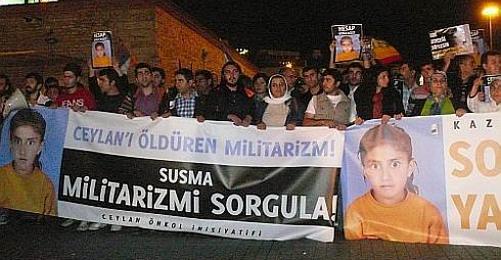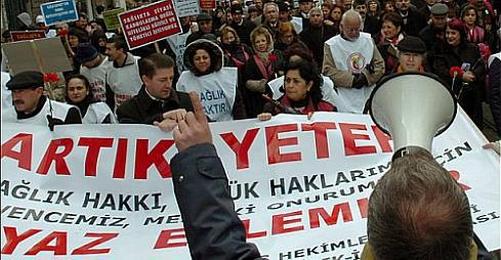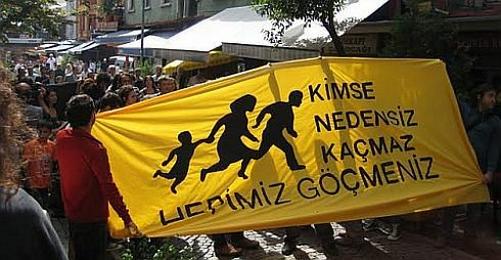Ruling AKP Is No Exception to Ban Liquor
The government had previously transferred the authority to grant permission and licenses to places that sell liquorto local administrations. The Uskudar District Municipality in Istanbul and the Antalya Metropolitan Municipality had attempted to implement the practice but suspended their efforts in the face of strong reaction.
According to sociologist Sezin Aydemir from the Marmara University, the AKP government has devised such an liquorstrategy after failing to deliver promises to its voters on religious high schools and headscarves.
Journalists Ozcan Yazici and Rustem Avci from the Bursa Contemporary Journalists' Association, stated that the reasons of the decision are incoherent. "The municipality claims it reached this decision due to the annoyance of the people of Bursa. But people did not go out on the streets and say 'we do not want places that sell alcohol.'"
Rifat Aras and Kemal Yavuz from Bursa are also against the practice: "We don't believe that places that sell liquorencourage people to consume alcohol. We believe there is something else that lies beneath this implementation. They cannot serve the society through bans but only through cultural encouragement."
Kenan Kir, the Economy head of the Osmangazi Municipality said he was sure the practice would stay in place: "Even if the Metropolitan Mayor vetoes the decision taken by the municipal assembly, the decision will still be implemented since it was taken by majority of vote."
Places that sell liquoroutside city centers
The Osmangazi Municipal Assembly discussed the "areas for places that sell alcohol" report during its meeting on January 5. The report, prepared by the Budget and Financial Affairs Commission was adopted by majority of vote.
The report states that there will not be any places that sell liquoron the Birinci Murat, Cemal Nadir, Cumhuriyet, Darmstad, Demiryolu, Gazcilar, Hasim Iscan, Kibris Sehitleri, Kukurtlu, Oulu, Temiz and Zubeyde Hanim Avenues and Ankara Yolu, Mudanya Yolu, Pembe Carsi and Degirmen Streets.
Kir: It will be better this way
"We do not want to look as if we are against alcohol," said Kir, who answered bianet's questions on behalf of the municipality. "But we find this practice beneficial in terms of public wellbeing, security and better supervision."
"There was a three to one majority at the assembly. Even if the Bursa Metropolitan Mayor vetoes the decision, it will still be implemented."
People in Bursa are against the decision
Kemal Yavuz, who served as a municipality administrator in the past, said the issue has turned into a social problem.
"The practice is in no way acceptable," said Yavuz. "It is based on personal sentiments. It is not true that they seek public wellbeing through this decision. Unless there is a political opposition, there may be further arbitrary implementations."
Another local in Bursa, Rifat Aras, said bans never lead to positive outcomes. "I condemn this practice," said Aras. "Public wellbeing can only be overseen through cultural restructuring, not bans."
Journalists: People in Bursa had no complaints about places that sell liquor
Journalist Ozcan Yazici, a former head of the Bursa Contemporary Journalists' Association, does not believe that the Osmangazi Municipality implemented the practice for "public wellbeing" or due to "complaints." According to Yazici, it is the lack of places that sell alcohol, which causes unrest, rather than their presence.
Journalist Rustem Avci said the municipality claims it is implementing the practice due to the complaints of the people. "But the municipality does not listen to what the people are saying on other issues," said Avci. "Without paying attention to the petition signed by 600 people, it is building the ourth mosque in a village that already has three."
Aydemir: Ban is an intervention in people's lifestyles
Sociologist Aydemir talked about the possible outcomes of the 'red street' practice. "AKP is pursuing a strategy to please its voters," said Aydemir. "But I don't think they will be successful because the 'red street' implementation is a flippant initiative. And its substructure has not been prepared."
"AKP is trying to cover up its many undelivered promises, like religious high schools, and its failures on issues like the headscarve decision by the European Court of Human Rights through this 'red street' practice."
Aydemir said this ban is an intervention in people's lifestyles.
"Many provinces in Anatolia are conservative. This implementation may lead to problematic outcomes."
Aydemir believes the practice will most probably hurt the tourism economy. She stated that she doesn't believe the practice will be implemented, mainly due to reaction and pressure by the media.
Bans at 62 provinces and all parties
Discussions on an liquorban have a long history. According to figures by the Tobacco, Tobacco Products and Alcoholic Drinks Market Regulatory Board (TAPDK), alcoholic drinks production has decreased in 2003-2005.
On the other hand, according to a report in the Sabah newspaper, there is a ban on drinking and selling liquorin 62 provinces in Turkey. The municipalities of 47 of these provinces are administered by AKP, while Sirnak, Tunceli, Diyarbakir, Hakkari, Batman municipalities ar administered by the Democratic Society Party (DTP); Artvin, Trabzon, Icel, Mugla municipalities are administered by the Republican People's Party (CHP); Kastamonu, Nigde, Gumushane municipalities are administered by the Nationalist Action Party (MHP); and Bartin and Ordu municipalities are administered by the Democratic Leftist party (DSP).
Sirnak Mayor Ahmet Ertak, who answered bianet's questions about the issue said it was out of question for the municipality to impose a ban. "There are only a few places that sell liquorbecause the people here are mostly against alcohol," said Ertak. "It is not true that the municipality does not want to grant licenses."
Five of the 19 municipalities that do not impose an liquorban are administered by the CHP, and the rest by AKP.
There are red streets in Malatya for the last 15 years
According to a report by the Malatya 'Son Nokta' newspaper, there has been an liquorban in Malatya for the last 15 years. The report states that Islamic parties have been in power in the region since 1990 and adds that AKP has continued the practice of not granting licenses to places that sell liquorand furthermore, implemented the 'red street' practice.
According to the paper the practice is 'unhealthy' because the 'red street' has not become a place for alcohol, but a place for crime. The society is disturbed, adds the paper.
Liquorban imposed as liquorproduction falls
According to figures by TAPDK, total liquorproduction, which was 43.303.818,71 mA liters in 2003, rose to 67.503.087,28 mA liters in 2004. But in 2005, production fell to 55.089.270 mA liters.
According to figures by the Turkish Statistics Institute, beer consumption rose in the years 2000-2004, while vodka and gin consumption fell. Wine consumption stayed the same in the period, while raki consumption decreased. (EZO/EK/EA/YE)
Politician and NGOs Urge for Clarification of Önkol's Death

EU PROGRESS REPORT
Women's Rights Must be Implemented in Daily Life

Protests against Health Care Contribution Rate

Greens Launch Trial for Palovit Valley

"When Will Mohsen Abdolkhani and Hamid Karimnia Be Released?"






